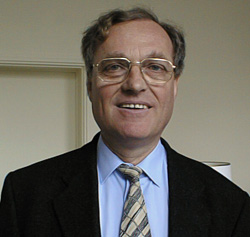Dear Genevieve and Yannick, dear Ladies and Gentlemen, dear colleagues, dear friends
I am completely overwhelmed by the speech of Geneviève and Yannick. You knows that I prefer shadows to sunlights but today I truly feel that I am living an exceptional evening.
It is a wonderful surprise to see so many colleagues, old and young, at this dinner, some of them from remote places and not involved in gravitational lensing. Friendships have blossomed all along the forty years of my working life.
Several works accomplished with some of you are now bursting into my mind - the study of the solar corona, - the development of many instrumental devices for astronomy and occasionally medical sciences, and finally our extragalactic and lensing observations.
I see many of my former students. They told me that the qualities they appreciate in me were my enthusiasm, curiosity and imagination. I am quite conscious that if I might have contributed at a modest level to the progress of observational astronomy, this is because I was working with gifted persons in a joint effort. Here I want to mention JP Picat and the Toulouse team, who were able to transform a dream into an instrumental reality. It would take too much of your time
tonight for me to thank all those colleagues who have helped me. At least allow me to quote some of them and the major places that have imprinted a durable mark on me.
Meudon Observatory with P. Felenbok, Boulder Colorado with Bob Mac Quinn and University College in London with Alec Bocksenberg certainly correspond to my initiation in instrumental astronomy.
Then follows the period of emancipation from my masters. The CNRS gave me the possibility to develop an astronomical group on the space campus of Toulouse. It was in Toulouse at the end of the eighties that we began our studies of gravitational lensing.
Along this scientific adventure, I made many good friends at CFHT, ESO and Max Planck Institutes under the guidance of Peter Schneider and Sandro d'Odorico. During this period I met Israel Kovner, Jordi Miralda-Escude and Richard Ellis who brings a lot to my students.
Finally, in 1996, I was called to administrative duties and I discovered the grand-design bureaucraty of the CNRS, but also fascinating colleagues working in different scientific fields. Many thanks to J F Minster, G. Debouzy, F Casoli and all my IAP colleagues. From this last period, as the director of IAP, I was really indebted to the numerous visitors that have helped us to keep IAP a living scientific place. Here I wish to address a special thanks to Prof. Simon White who was so often acting as a chairman of our “French speaking” astronomical committees and who acted as a tremendous partner of our European astronomical laboratories association, the so-called EARA.
Indeed a scientific life is not only a succession of good moments. It brings successes and disappointments, happiness and pains. This evening, I keep in mind the pioneering contributions of Bohdan Paczynski to lensing. He left us to early, and I want to honor his memory. He was the first to point out the true nature of gravitational arcs in his 1986 paper published in Nature. Then we came back to our spectrographs and confirmed his extraordinary claim.
I remember the last discussions I had at IAP with Bohdan, a short time before he was struck by illness.
Bohdan had an extraordinary intuition mixed with a great generosity. We are remembering him, not only for his scientific contributions, but as the gentleman that he was.
Now I want to thank Roger Blandford and Simon White for accepting to give the opening and closing talks of this lensing conference.
I thank all of you for your presence here tonight and for such a friendly message delivered by my “très fidèles amis” Genevieve, Yannick and Jean-Pierre.
Last but not least, I thank my wife Mireille who has shared my career and life with a miraculous complicity.
With many of you, I have shared these unique moments of discoveries where we feel that kownledge and generosity is a good source of happiness.
Bernard FORT
